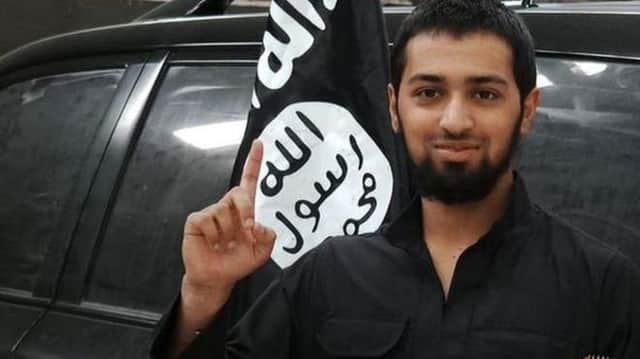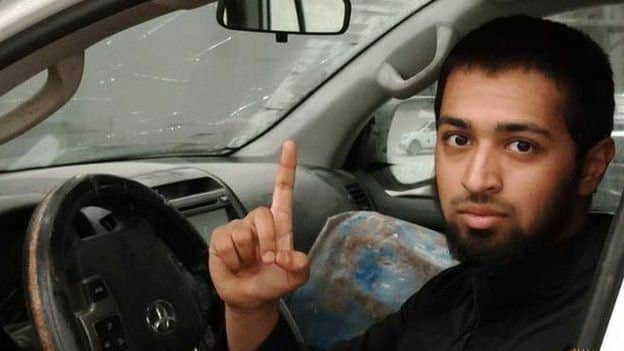Teenager ‘is youngest British suicide bomber’


Talha Asmal, 17, who detonated a vehicle fitted with explosives, was described as “a loving, kind, caring and affable teenager”, who never harboured any ill will against anybody.
His family said despite his death not being officially confirmed, photographs showing a youth purportedly named Abu Yusuf al-Britani appear to depict their 17-year-old son.
Advertisement
Hide AdAdvertisement
Hide AdIf the reports are corroborated, Asmal would be Britain’s youngest known suicide bomber. Another West Yorkshire teenager, Hasib Hussein, was almost 19 when he blew himself up on a London bus in the 7 July 2005 attacks.


Asmal fled his home in Dewsbury, West Yorkshire, in March to join the militant group along with his friend Hassan Munshi, who was also 17.
Going by the name Abu Yusuf al-Britani, he is believed to have been one of four suicide bombers who killed at least 11 people in two separate explosions near the city of Baiji in Salahuddin province, in an attack understood to have happened on Saturday.
Photographs of the other fighters have also been released. They are believed to be Palestinian, German and Kuwaiti nationals. Several other details have emerged, providing a rare glimpse into the planning of the recent suicide bomb mission.
Three of the four bombers can be seen sitting on a thin mattress, taking instructions on the mission from a commander who wears a khaki baseball cap.
Abu Yusuf al-Britani appears to be holding an AK 47 rifle and listening intently as his instructor runs through his presentation from a laptop. The first attack saw three suicide bombers target the local HQ of an Iraqi Shi’ite militia group in al-Hijjaj – close to the oil refinery.
The second attack reportedly targeted Iraqi forces near the Baiji refinery. The insurgents who took part are thought to come from Russia and Kazakhstan.
Yesterday, the family of Asmal said he came “from a close-knit, hard-working, peace-loving and law-abiding British Muslim family” which unreservedly “condemns and abhors all acts of violence wherever perpetrated”.
Advertisement
Hide AdAdvertisement
Hide AdThey said despite him never exhibiting any extreme or radical views, he had been exploited by extremists on the internet “in a process of deliberate and calculated grooming of him”.
Unknown to them, he travelled to Iraq via Turkey and fell under the spell of Islamic State, or Isis, handlers who are “too cowardly to do their own dirty work”.
“We are all naturally utterly devastated and heartbroken by the unspeakable tragedy that now appears to have befallen us,” they said. “We need time and understanding to come to terms with our unimaginable and painful loss.
“As a family we would like to take this opportunity to unequivocally state that ‘Isis’ are not Islam. They do not represent in any way, shape or form Islam and Muslims and we are no longer prepared to allow a barbaric group like Isis to hijack our faith. Isis – not and never in our name.”
The statement added: “As a family we would urge anyone who has any concerns about their own family members being exploited in a similar way to seek the help and advice of the police as soon as possible.
“We are all understandably grief-stricken and do not propose to make any further press statements at this stage.”
Shahid Malik, a former government minister and a family friend of the Asmals, described them as “a beautiful, caring, peace-loving and incredibly humble family”.
The former MP for Dewsbury said: “The local community grieves with them today, Ebrahim [the father] and the family’s world has been shattered in the cruellest of ways and one which no family should ever have to experience.
Advertisement
Hide AdAdvertisement
Hide Ad“Talha was a truly sweet-natured, helpful, respectful and friendly kid and it is incredibly difficult to reconcile this Talha with the suicide-bomber at an Iraqi oil installation. My thoughts and prayers are obviously also with those killed at the oil installation and their families. It is disturbing to see how relaxed he looks in the Isis photographs allegedly taken just prior to his suicide mission.
“He looks at peace. It’s like he’s ready to go and meet his maker. This is a clear indication of just how successful the evil Isis groomers have been in poisoning and brainwashing Talha and kids like him.
“We must defeat Isis in mosques and communities across the country. This is a generational struggle and everyone must be willing to rise to the challenge. Importantly, it’s a struggle which can only succeed if it is one which is led by Muslims themselves.”
At least 700 people from the UK have travelled to support or fight for jihadist organisations in the area, with most joining IS.
West Yorkshire Police Assistant Chief Constable Russ Foster said people who travel to Syria and parts of Iraq are likely to witness extreme violence and could become victims of violence themselves.
He said: “As part of the Prevent initiative, West Yorkshire Police is committed to working with communities and local authorities, to highlight the dangers associated with radicalisation and travel to regions such as Syria and Iraq. We are all working together to help identify vulnerable members of our society and intervene and engage them before it is too late.
“If anyone has concerns that a friend or relative may be vulnerable to radicalisation, expressing extreme views or contemplating travelling to Syria or Iraq, it is vital that we work together to try and prevent that person from travelling.”